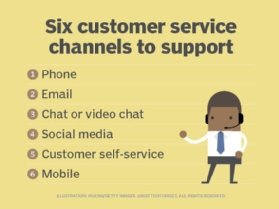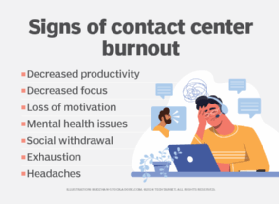10 must-have contact center skills for agents in 2024 (original) (raw)
Contact center agents must have a wide range of interpersonal and technological skills to interact with customers and resolve their issues in a timely and empathetic manner.
Contact centers have evolved significantly during the past few years, requiring contact center agents' skills to keep up. To deal with new forms of communication, hiring managers must ensure contact center agents have more than verbal communication and people skills. Writing and reading comprehension skills for email, chat and social media are growing in importance as are the use of body language and visual observation skills for video chat.
The migration to remote work environments means contact center agents must be comfortable working independently and be able to communicate and interact with peers and leaders via alternative communication channels.
Finally, agents must have an understanding of and appreciation for the benefits and limitations of new contact center software, including knowledge management systems and agent assist technologies.
Why are soft skills important in today's contact center?
When contact center agents interact with customers -- regardless of the channel of communication, where they work, or the contact center software and systems they use -- soft skills are of critical importance.
An agent must resolve the issue and communicate in a manner that's understandable to the customer and shows care, understanding and confidence. It's important that agents don't sound robotic, and display empathy and caring when listening to a customer's issue and communicating the resolution.
These contact agent soft skills are the "icing on the cake" in driving an outstanding customer experience.
Most common contact center agent skills
Many basic contact center agent skills haven't changed during the past few years, but there are additional skills that contact center agents must have to successfully perform their job.
Here are 10 key contact center agent skills that managers should look for when hiring.
1. Interpersonal skills
Contact center managers must look for agents with exceptional people skills who thrive on working with people to understand their issues -- whether the agent can relate to them or not -- and solve them.

2. Excellent communication skills across channels
Contact center agents interact with customers across a variety of communication channels, including inbound and outbound calls, email, web chat, text messaging and video. Many of these channels require different types of communication skills from a listening and speaking perspective. While an individual agent doesn't need to excel at communicating in all these channels, they must exhibit the skills necessary for any channels they will support.
3. Professional and courteous demeanor
Customers reaching out to a contact center might be frustrated and emotional, depending on the issue they're trying to resolve. Contact center agents should be sensitive to a customer's feelings, always have a courteous demeanor, and display empathy and patience when providing customer service, regardless of the channel of communication.
4. Excellent problem-solving skills
Customers often reach out to a contact center with complex issues that are difficult to explain. Agents must be able listen to the customer, identify the core issue, work independently and provide a resolution that serves both the customer and the organization. Contact center agents must have training in active listening so they can ask questions, clarify points and summarize what the customer said to ensure they have all necessary information to assist the customer. If they can't resolve a customer inquiry immediately, the agent should know how to find the solution. Customer satisfaction increases if contact center agents are creative and go above and beyond to find answers for their customers.
5. Ability to learn, retain and apply large amounts of information
Agents must learn and retain a tremendous amount of information regarding products, services, policies and procedures. In cases in which they don't have an answer, agents must understand how to navigate across several systems, such as a knowledge management or CRM system, to find the answer to the customer's inquiry.

Common examples of burnout amount contact center agents.
6. Ability to accept and meet quantitative goals
The contact center environment is extremely metric-driven, so monitoring metrics and KPIs is important for the performance management process. Agents often have quantitative goals such as quality monitoring results, average handle time, attendance and occupancy that managers measure and reward them for. Agents must be willing to work in an environment where their managers monitor, track and report most of their activities.
7. Ability to work in a highly structured environment
Contact center agents must adhere to strict schedules, deal with a large volume of transactions, have exceptional time management skills, and follow detailed attendance and punctuality policies. Agents should be monitored to ensure they're comfortable working in this type of structured environment.
8. Flexibility
Organizations constantly change by rolling out new products, services and features to attract new customers and retain current ones. In most cases, agents receive notification of these changes in a timely manner, but there are many times when the customer knows about a change before an agent does. Agents must be flexible to deal with these instances and cannot be overwhelmed when surprises occur.
9. Comfortable working remotely
It's important to realize that at times it can be lonely and remote workers might not have the same personal connections as on-site workers. Additionally, not having the ability to have in-person meetings and coaching sessions requires the use of other communication techniques to support learning and engagement. New hires must be comfortable working remotely and have the skills and demeanor to succeed in this type of environment.
10. Good judgment and common sense
As contact centers use more advanced technology, agents must use tools in new ways and determine when something does or does not make sense. For example, agent assist technology offers automated recommendations to a contact center agent following analysis of a customer inquiry. The recommendation is usually correct, but there could be multiple solutions or the solution provided isn't correct. Contact center agents must have strong judgement skills and common sense to ensure technology is used properly.
While there are many specific contact center agent skills needed to be successful, the most important one is enjoying the job. Agents that naturally show patience, passion and determination will perform their job well.
Editor's note: This article was updated in August 2024 to reflect changing contact center agent skills and to provide a better reader experience.
Scott Sachs is president and founder of SJS Solutions, a consultancy that specializes in contact center strategy assessments and technology selection.
Demetra Edwards also contributed to this article.
Next Steps
Ways to improve contact center agent performance
Best practices for contact center agent training programs
What does a customer service manager do?
Customer service skills and how to develop them
Examples of bad customer service and how to avoid them
Dig Deeper on Customer service and contact center
-
 What is skill-based routing (SBR)?
What is skill-based routing (SBR)?  By: Griffin LaFleur
By: Griffin LaFleur -
 10 strategies to improve contact center agent performance
10 strategies to improve contact center agent performance  By: Sarah Amsler
By: Sarah Amsler -
 What is call management?
What is call management?  By: Alexander Gillis
By: Alexander Gillis -
 The ultimate guide to contact center modernization
The ultimate guide to contact center modernization  By: Ron Karjian
By: Ron Karjian
Related Q&A from Scott Sachs
How to calculate call center utilization rates
Customer service leaders use metrics like call center utilization rates to track performance and CX. Leadership must learn the effects of these rates...Continue Reading
What does a customer success manager do?
The customer success manager is an essential CX role that takes a proactive approach to ensuring customer loyalty and retention when the sales ...Continue Reading
Why is customer self-service important for contact centers?
The advancement of conversational AI coupled with customers' growing desire for empowerment has made self-service channels critical for contact ...Continue Reading